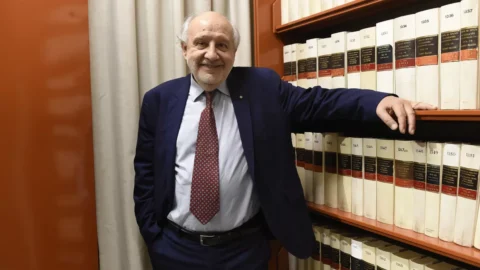Go on like this. Not even the taxman is able to stop the march of Finecobank which closed November, the month of taxes, with a collection net of the payment of taxes of 280 million. And Piazza Affari, pleasantly surprised, celebrates the umpteenth exploit of the bank of the Unicredit group which does not know the word crisis. Even so, the war machine that is about to exceed 5 billion in funding in a year (we are at 4.970 million in eleven months) demonstrates that it has passed its maturity exam with flying colours, subject after subject: the online broker which 18 years ago was the first to explain to Italians how to invest electronically, has now become the first bank, the reference one, for the million-odd customers (1.196.000, to be exact, 9.840 more in the month alone of November) who have learned to appreciate the mix of efficiency and quality guaranteed by cybor advisory, digital at the service of the human factor, or the army of consultants under the guidance of Alessandro Foti. A formula which, in the first eleven months of 2017, translated into 107.147 new customers. Here is the interview that Foti, the CEO of Finecobank, gave to FIRSTonline.
Sooner or later the flow will slow down. Or maybe it will stop. Have you prepared for that moment?
“For now we acknowledge that Italians are finally learning, after several hard lessons, to understand that saving requires competence. It took several shocks, from the sovereign debt crisis to negative interest rates to the risk of bank defaults, for them to convince themselves that one cannot rely on chance or give in to laziness. The Italian market includes wealthy families, but with an unbalanced exposure in favor of real estate investment. A market that boasts a savings stock of over 4 trillion, well in excess of the amount of public debt. There is a lot to do, even if financial knowledge, on average very modest as polls and surveys confirm, does not help. But the situation can also improve in this respect, with great benefit for those who are more competitive".
Could the novelty of the PIRs, who are just one year old, come in handy?
“The positive effects of the PIRs are twofold. First of all, a greater efficiency of the market is promoted, favoring the growth of the price list. But, above all, it gives a boost to medium-long term investments, as those intended for savings should always be”.
It is in this framework that your growth objectives are triggered. In the foreground, to read your communications, there are the guided products. What is it about? And why are they so important?
“These are the targeted products, the result of our consultancy services, offered to our customers. In 2014, 36% of the assets under management were worth. In November, their incidence on total managed assets increased to 63 percent, demonstrating the validity of our advanced consultancy solutions, which are increasingly appreciated by customers. It is a strategy which, in addition to rewarding customers, offers significant advantages. But there is another reason: the efficiency of our services allows our consultants to have more time to assist clients. And, of course, to look for new ones”.
In short, the growth of guided products increases the productivity of the system. Is that it?
“We aim for both quantitative and qualitative growth. The goal is to provide very efficient services but at a fair price. It's the formula that works for both managed and wealthier clients, as demonstrated by our growth in private banking. The logic is the same and we try to follow it in all the services we offer, including lending”.
Another way to hunt for new clients?
“No, we offer these services to clients we already know whose creditworthiness and solvency we can assess.”
Lending is not a means of expanding the customer base, but serves to make Fineco increasingly the bank of reference for all your customer's needs. But how does the decision to open an asset management company in Ireland fit into this picture? Wasn't the activity of distributing other people's products enough for you, which has also guaranteed you so many successes? Why the decision to open a "factory" to develop the new offers?
“Mind you, ours will remain an open platform, with a large presence of third-party products. But the creation of our own product factory will make it possible to bring part of the value chain within the company, with clear benefits for profits”.
Do you already have an idea about it?
“Our asset management company will become operational in a few months, between the first and second quarters. But already today I was able to verify that the savings, compared to the conditions applied by external suppliers, can be very significant".
Furthermore, Ireland is notoriously an attractive fiscal land. Or not?
“In our case, the taxman has nothing to do with it. Ireland is by far the most efficient and competitive place for the thrift industry, what our industrial districts are for shoes. Behind a fund there are technologies and rules that savers don't even know".
Yes, the technology. It was one of the keys that allowed Fineco to establish itself on the market. But today Fintech is changing the rules of the game. From next year, with the introduction of the PSD 2 directive, with the approval of the customer, banks will have to transfer the data available to third parties. And a new kind of competition will arise. There are already those who foresee competition from Amazon on mortgages. For example. Worried?
“Frankly not. It seems to me a futuristic and somewhat improbable scenario because I don't see the convenience of entering such a complex and regulated field. It may be that business alliances arise. But the real discriminating factor is the relationship that the customer has with the bank. If there is a strong and solid relationship based on trust, the relationship holds. After all, we too are aware of the strategic value of Big data: we will know, as always, how to use the opportunities offered by technology".
In the meantime, get ready to digest the novelty of Mifid 2.
"We are ready. I don't know if it will be an easy digestion for everyone. Certainly the directive imposes greater transparency, starting with a communication, at least annually, of the costs that today a distracted customer can miss".
And you have a clear conscience.
“Our philosophy still rests on the initial three pillars: a cost base that falls as the bank grows; process and product innovation; loyal approach with the customer, commissions included, to make the business more sustainable. Out of principle but also out of convenience. A simple mathematical calculation is enough to understand that I earn more over time if, let's say, I pay the customer 100 instead of just 50 by withholding more commissions than due. In the first case, the client's assets increase more and the mass on which I earn will grow. In a few years time and the most correct manager will earn more”.





